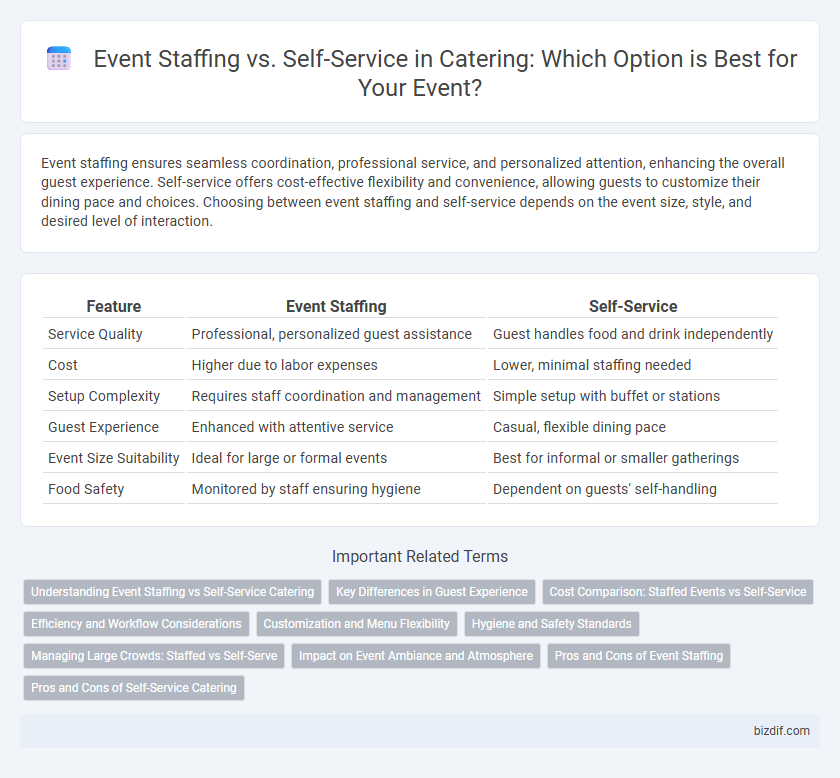Event staffing ensures seamless coordination, professional service, and personalized attention, enhancing the overall guest experience. Self-service offers cost-effective flexibility and convenience, allowing guests to customize their dining pace and choices. Choosing between event staffing and self-service depends on the event size, style, and desired level of interaction.
Table of Comparison
| Feature | Event Staffing | Self-Service |
|---|---|---|
| Service Quality | Professional, personalized guest assistance | Guest handles food and drink independently |
| Cost | Higher due to labor expenses | Lower, minimal staffing needed |
| Setup Complexity | Requires staff coordination and management | Simple setup with buffet or stations |
| Guest Experience | Enhanced with attentive service | Casual, flexible dining pace |
| Event Size Suitability | Ideal for large or formal events | Best for informal or smaller gatherings |
| Food Safety | Monitored by staff ensuring hygiene | Dependent on guests' self-handling |
Understanding Event Staffing vs Self-Service Catering
Event staffing in catering ensures professional service, smooth coordination, and personalized guest experience, while self-service options offer cost efficiency and flexibility for casual or large-scale events. Choosing between staffed and self-service catering depends on event size, budget, and desired level of formality. Staffing caters to fine dining and corporate functions, whereas self-service fits informal gatherings and buffet-style setups.
Key Differences in Guest Experience
Event staffing enhances the guest experience by providing personalized service, ensuring timely food delivery, and managing guest needs, which creates a seamless and memorable event atmosphere. Self-service offers guests autonomy and faster access to food, but may lead to longer wait times and less interaction with staff, potentially affecting the overall ambiance. Choosing between staffed catering and self-service depends on the desired level of engagement, event size, and the formality of the occasion.
Cost Comparison: Staffed Events vs Self-Service
Staffed events typically incur higher costs due to wages for servers, coordinators, and cleanup crews, averaging 20-30% more than self-service setups. Self-service options reduce labor expenses significantly by allowing guests to serve themselves, which is ideal for budget-conscious events or casual gatherings. Event planners must weigh these cost differences against the desired guest experience and service quality to determine the optimal staffing approach.
Efficiency and Workflow Considerations
Event staffing ensures streamlined efficiency by assigning trained personnel to manage food service, reducing wait times and minimizing errors, which optimizes overall workflow. Self-service models can lower labor costs but may lead to congestion and inconsistent guest experiences, potentially disrupting meal pacing and event timing. Choosing between staffed service and self-service depends on event scale, guest expectations, and the desired balance between cost-efficiency and service quality.
Customization and Menu Flexibility
Event staffing in catering offers personalized service and dynamic menu adjustments, enhancing guest experience through tailored interactions and real-time customization. Self-service models prioritize convenience and efficiency but limit menu flexibility, often relying on predetermined food stations or buffet options. Customized event staffing enables seamless adaptation to dietary preferences and instant menu changes, making it ideal for diverse or upscale events.
Hygiene and Safety Standards
Event staffing ensures strict adherence to hygiene and safety standards through professional training and real-time management, minimizing contamination risks. Self-service setups increase the likelihood of cross-contamination due to multiple guests handling food and shared utensils. Prioritizing trained staff reduces health hazards and maintains high sanitation levels essential for successful catering events.
Managing Large Crowds: Staffed vs Self-Serve
Effective management of large crowds in catering events often requires a strategic choice between staffed service and self-service models. Staffed events provide personalized assistance, ensuring smooth flow and quick issue resolution, which minimizes bottlenecks and enhances guest satisfaction. Self-service setups can handle high volumes efficiently but demand clear signage and well-organized stations to prevent congestion and maintain order.
Impact on Event Ambiance and Atmosphere
Professional event staffing enhances the ambiance by providing attentive service that fosters a welcoming and polished atmosphere. Trained staff manage guest needs seamlessly, allowing hosts and attendees to focus on socializing and enjoying the event. Self-service setups may reduce costs but often result in a more casual and less cohesive environment, impacting the overall tone and guest experience.
Pros and Cons of Event Staffing
Event staffing ensures professional service, personalized guest interaction, and efficient coordination, enhancing the overall event experience. However, hiring staff increases costs and requires additional management, potentially complicating logistics. Self-service reduces expenses and encourages guest autonomy but may lead to longer wait times and less attentive service.
Pros and Cons of Self-Service Catering
Self-service catering offers greater flexibility and cost savings by reducing the need for hired staff, allowing guests to serve themselves at their own pace. This approach minimizes labor expenses but can lead to longer wait times and potential food waste if not properly managed. However, self-service may reduce the personalized experience and efficiency that professional event staff provide during catering events.
Event staffing vs self-service Infographic

 bizdif.com
bizdif.com